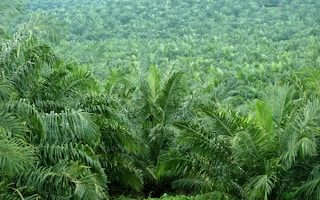Palm oil is widely recognised as one of the world’s most important crops. We produce a valuable natural product; one that is subject to growing global demand and which benefits from yields per hectare that outperform any of our competitors, meaning that significantly less land is required to deliver the same yields as other three major oil producing crops: soya, rapeseed and sunflower.
As an industry we are well suited to all types of production, whether commercial or smallholder led, and this means that benefits can be widely shared. Our industry has enriched millions of people and helped to build the economies of countries around the world. Palm oil production is a lifeline for an estimated 1.5million smallholder farmers in Indonesia, whose plantations account for 40 per cent of Indonesian palm oil production across 4.2million hectares of land1. Palm oil is found in countless daily essentials and has a hugely positive role in society.
Yet this ubiquity can come at a cost. The low start-up costs as a grower which make it relatively easy for smallholders to set up business can also provide huge challenges around traceability. Demand for palm oil production has played a role in deforestation and continues to do so today. Clearing land for palm oil production has also been a factor in the SE Asia haze crisis of 2015.
Whilst less than 0.5 per cent of our planted area has been subject to fire, and I am confident that no responsible palm oil producer is supporting fire, with so many routes to market and so many buyers, we in the industry must look at new ways to encourage more responsible behaviour and tackle the drivers of fire.
The RSPO is undoubtedly helping to make sustainable palm oil the norm. However significant challenges remain. As an example, this year the RSPO expects to certify approximately 11.64 million tonnes, or just 20 per cent of the global total. Yet, by October of this year, less than 5 million tonnes had been sold as certified, and less than 2 million of that was segregated or mass balance.
Cheap, mass produced and unsustainably sourced palm oil puts undue pressures on the environment, ecosystem and the livelihoods of individual smallholders. Sustainable production comes with costs, but the value to the environment is incomparable. This is why certified sustainable palm oil must be encouraged industry-wide and accepted by the brands, traders and consumers who benefit from our product.
Golden Agri-Resources (GAR) led the industry into pioneering new approaches in 2011 with our Forest Conservation Policy, which committed us to zero-deforestation, and since then we have seen the other signatories to the Indonesian Palm Oil Pledge (IPOP) make similar commitments. In the face of ongoing challenges it is essential that we don’t abandon progress but evolve our approach and demonstrate that sustainable production has broader benefits.
As a leader in the industry we have launched our new GAR Social and Environmental Policy: a wide-ranging commitment, which has been developed in consultation with leading NGOs and reflects the challenges and five years of experiences in driving sustainable change on the ground in Indonesia.
At its heart is a new approach to our own operations, focusing more on how our operations impact those around us, and ensuring that plasma smallholders benefit equally. We will continue to protect conservation areas as it is a social good and of direct benefit to our business, but we recognise that this is only viable if communities benefit as well.
That means more smallholder palm oil in our supply chain, and it means better going further to consult and actively involve local communities in the protection of natural forest. As part of this we are working with the local community in West Kalimantan to rehabilitate a damaged peatland area of 2,300 hectares.
It also means being prepared to engage with the wider challenges facing our industry. In our case, Indonesia needs solutions to the pressing challenges of economic growth, climate change, forest loss and fire. We believe that one area where the palm oil industry can deliver solutions is in helping Indonesia to reduce the pressure on its land, by increasing yields and developing viable alternatives to land clearance.
We need more brands to take action in their supply chain, consumers to support our efforts by demanding sustainable palm oil, NGOs to support the industry forward and governments to provide appropriate regulatory support.
On yields, GAR is committed to continuous improvement and this year we are aiming for an average yield of 5.8 tonnes per hectare, a 12 per cent increase on 2010. In 2014 our plantations achieved a yield of 5.04 tonnes and our smallholders only just behind at 4.75 tonnes.
Compare this to the 1.5-2 tonne average achieved by smallholders outside of our supply chain and the enormous potential scope for improvement through better science, training, equipment and the sharing of expertise is clear. Looking to the future, when land is scarce and the impacts of climate change become more apparent, it is clear that being able to sustainably deliver improved yields will become ever more critical.
On alternatives, this is about creating a bigger role for local communities and taking a critical view of social responsibility spending - is it targeted, is it effective, is it the most we can do? In GAR’s case, this means working closely with other members of IPOP to target communities around our concessions.
Through support for alternative livelihoods we can help local communities avoid using fires in their agriculture practices. We are seeking to help independent smallholders boost their livelihoods sustainably with replanting initiatives, innovative financing and long-term purchasing agreements, provision of better seeds, and sharing best practice on productive farming.
GAR and other responsible producers cannot solve all these challenges alone. We need more brands to take action in their supply chain, consumers to support our efforts by demanding sustainable palm oil, NGOs to support the industry forward and governments to provide appropriate regulatory support.
By broadening the benefits of our businesses and by sharing our expertise, we can demonstrate that sustainable methods of palm oil production are not only crucial in protecting the environment, but also in meeting consumer demand and driving long-term economic development for local communities and the country as a whole.
Agus Purnomo is managing director for sustainability and strategic stakeholders engagement, Golden Agri-Resources.


















